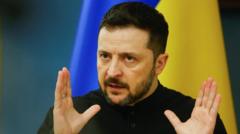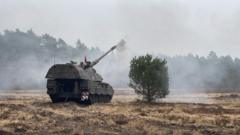Zelensky's recent meetings in Paris reveal a blend of optimism and uncertainty regarding Ukraine's security amidst shifting international alliances and the complexities of the ongoing conflict with Russia.
Zelensky's Optimism Amid Europe's Security Dilemmas

Zelensky's Optimism Amid Europe's Security Dilemmas
Ukrainian President Zelensky expresses hope in Paris for stronger European security guarantees, contrasting past tensions with US leadership.
During a meeting in Paris with a group of European journalists, Ukrainian President Volodymyr Zelensky displayed a buoyant demeanor, even as he grappled with the realities of securing Ukraine's future. Just before our conversation, he had concluded a discussion with French President Emmanuel Macron at the Elysee Palace, where the Eiffel Tower shone in yellow and blue—symbolizing solidarity with Ukraine.
Zelensky's visit was aimed at engaging with leaders from 30 nations, as they strategized on forming a "coalition of the willing," led by Macron and UK Prime Minister Sir Keir Starmer, to find ways to guarantee Ukraine's security in case of a long-term ceasefire. This warm reception markedly contrasted his recent experience at the White House, where he faced a less welcoming attitude from former President Trump and his administration, leading to a troubling suspension of American military aid.
Despite the restoration of assistance after diplomatic efforts from Zelensky and European allies, a lingering mistrust remains regarding America's reliability as an ally. Many European leaders are publicly committed to the transatlantic relationship, yet the assembly of nations in Paris signals a growing awareness that dependency on U.S. support may no longer suffice.
In our conversation, Zelensky remarked on the heightened defense spending initiatives by countries like the UK, France, and Germany, indicating that Europe might soon catch up to the U.S. in military capability—although such optimism may reflect a strategic acknowledgment of European partners rather than an accurate forecast.
With regards to Russia's recent demands for a ceasefire, particularly concerning concessions for a maritime ceasefire in the Black Sea, Zelensky emphasized the need for a robust American stance against Russian conditions. He expressed hope that the U.S. would maintain its strength and not yield to Russian pressure.
In addressing the complexities of U.S.-Russia negotiations, Zelensky critiqued comments made by U.S. representatives who seem to echo Russian narratives. He stressed the importance of rejecting such influences in order to preserve Ukraine's sovereignty.
As he continues navigating immense pressures since the onset of Russia's invasion, Zelensky exudes a conviction that transcends mere survival. He aims for a peaceful future for his children and measures himself against Russian President Putin, pointing out the latter's declining power and relevance.
Though Trump may pursue a swift resolution to the conflict, Zelensky remains committed to a longer-term strategy for Ukraine's independence and security, highlighting the resolve needed to face the evolving geopolitical landscape.






















